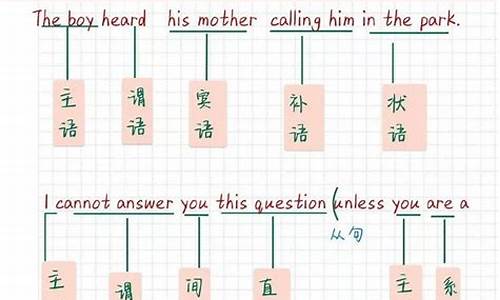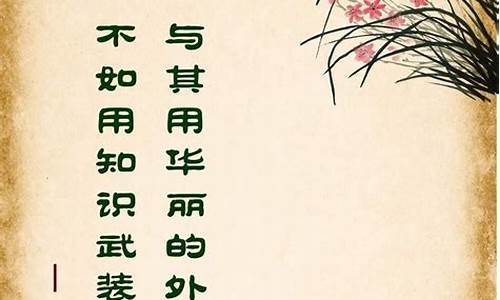您现在的位置是: 首页 > 文案大全 文案大全
英语句子结构划分练习题_英语句子结构例题
tamoadmin 2024-09-05 人已围观
简介1.英语句子成分划分并写出句子结构More than 6000 languages are spoken in the wo?2.英语句子结构问题3.一般英语句子怎么划分句子成分?4.高中英语,第五题,题目中的句子是如何断句的?结构感觉有些奇怪5.求下列划分句子成分答案A. We made a kite quicklyB. We made him a kiteC. We made him the
1.英语句子成分划分并写出句子结构More than 6000 languages are spoken in the wo?
2.英语句子结构问题
3.一般英语句子怎么划分句子成分?
4.高中英语,第五题,题目中的句子是如何断句的?结构感觉有些奇怪
5.求下列划分句子成分答案

A. We made a kite quicklyB. We made him a kiteC. We made him the chairpersonD. The lees all turn yellowE. The girl turned the keyF. Jacky seems to be sadG. Jacky was cryingH. The temperature rose a lotI. The volunteers bought the school some booksJ. We found something hiding among the lees ____________________________________________________________________________________________________________
S+V+O: A. We made a kite quicklyS+V+IO+DO B. We made him a kiteS+V+IO+DO C. We made him the chairpersonS+V+P D. The lees all turn yellowS+V+O: E. The girl turned the keyS+V+P F. Jacky seems to be sadS+V G. Jacky was cryingS+V H. The temperature rose a lotS+V+IO+DO I. The volunteers bought the school some booksS+V+DO+OC J. We found something hiding among the lees
英语句子成分划分并写出句子结构More than 6000 languages are spoken in the wo?
1.It(主语) remained(系动词) to be seen(表语).
主系表结构
2.When to go(主语部分,也就是整个从句充当主语.) has not been(谓语动词) decided(宾语) yet(副词).
主语从句
那你一定会问你怎么知道它是主语从句的呢?
很简单.因为谓语动词是HAS NOT BEEN,to go是非谓语动词形式(不定式)
3.He(主) talked(谓) as if(虚拟从句的连词,也就是确定他是否是虚拟语气的标志) he(从句的主语) had lived(从句的位于) there(从句的宾语) for years(从句的时间状语).
虚拟句
4.We(主语) three(we的同位语) went(谓语) together(补语).
同位语(不能算是同位语从句,因为同位语从句的结构是...news/information/report that+一句完整的句子)
5.He(主语) told(谓语) us(宾语) all what had hened yesterday(宾语补足语).
此句是宾语从句,tell后面可以+双宾语:us(宾语1,后面的则是宾语2)
英语句子结构问题
More than 6000 languages (主语)are spoken(谓语) in the world(地点状语) today(时间状语).
English(主语) is spoken(谓语) by more than 400 million people as their first language(方式状语).
Tea(主语) is grown(谓语) in Southeast China(地点状语).
Forests (主语)help (谓语)to keep water from running away(不定式短语做宾语),so drought(主语) does not ofern hen(谓语)(结果状语从句).
Young trees (主语)must be looked after(谓语) well程度状语.,7,
我是佳佳 举报
帮忙,再加分 1.They can be planted at the side of the road. 2.Sam wanted to know where he could trel for holiday.As he was busy searching the Internet,he became interested in how different countrids were. 3.They never knew what would hen to the world in a hundred years. 4.I wasn't going to speak at the meeting. 1.They (主语)can be planted(谓语) at the side of the road(地点状语). 2.Sam (主语)wanted (谓语)to know( 宾语)where he could trel for holiday(不定式动词know的宾语从句).As he was busy searching the Internet(时间状语),he(主语) became interested in(谓语) how different countrids were(宾语从句). 3.They(主语) never (状语)knew (谓语)what would hen to the world(宾语从句) in a hundred years(时间状语从句). 4.I (主语)wasn't going to speak (谓语)at the meeting(地点状语).,英语句子成分划分并写出句子结构
More than 6000 languages are spoken in the world today.
English is spoken by more than 400 million people as their first language.
Tea is grown in Southeast China.
Forests help to keep water from running away,so drought does not ofern hen.
Young trees must be looked after well.
一般英语句子怎么划分句子成分?
一.主语:主语(subject) 是一个句子的主题( theme), 是句子所述说的主体。它的位置一般在一句之首。可用作主语的有单词、短语、从句乃至句子。
1.名词作主语。 如:A tree has fallen across the road. (一棵树倒下横在路上。)
Little streams feed big rivers. ( 小河流入大江。)
2.代词用作主语。如:You’re not far wrong. (你差不多对了)。
He told a joke but it fell flat. (他说了个笑话,但没有引人发笑
3.数词用作主语。如:Three is enough. 三个就够了。
Four from seven lees three. 7减4余3。
4.名词化的形容词用作主语。
The idle are forced to work. 懒汉被迫劳动。
Old and young marched side by side. 老少并肩而行。
5.副词用作主语。如:Now is the time. 现在是时候了。
Carefully does it. 小心就行。
6.名词化的介词作主语。如:The ups and downs of life must be taken as they come.
我们必须承受人生之沉浮。
7.不定式用作主语。 如:To find your way can be a problem.你能否找到路可能是一个问题。
It would be nice to see him again.
如能见到他,那将是一件愉快的事。
8. 动名词用作主语。如:Smoking is bad for you. 吸烟对你有害。
Watching a film is pleasure, making one is hard work.
看**是乐事, 制作影片则是苦事。
9. 名词化的过去分词用作主语。如:The disabled are to receive more money.
残疾人将得到更多的救济金。
The deceased died of old age.
死者死于年老。
10. 介词短语用作主语。如:To Beijing is not very far. 到北京不很远。From Yenan to Nanniwan was a three-hour ride on horseback.
从延安到南泥湾要三个小时。
11.从句用作主语。如: Whenever you are ready will be fine.
你无论什么时候准备好都行。
Because Sally wants to lee doesn’t mean that we he to.
不能说萨利要走因而我们也得走。
12.句子用作主语。如:”How do you do ?” is a greeting.“你好”是一句问候语。
二.谓语
谓语(predicate) 或谓语动词(predicate verb) 的位置一般在主语之后。谓语由简单动词或动词短语(助动词或情态动词+主要动词)构成。
1.由简单的动词构成。
(1). What hened? 发生了什么事?
(2). He worked hard all day today. 他今天苦干了一天。
(3). The plane took off at ten o’clock. 飞机是十点起飞的。
2.由动词短语构成的谓语。
(1). I am reading. 我在看书。
(2). What’s been keeping you all this time? 这半天你在干什么来着?
(3). You can do it if you try hard. 你努力就可以做到。
3.英语常用某些动作名词代替表动态的谓语动词,表生动。这种动作名词之前常用没有多大意义的动词he, get, take, give 等。如:
(1). I had a swim yesterday. 我昨天游了一次水(had a swim 代替了swam)
(2). Take a look at that! 你看看那个!(take a look 代替了 look)
(3). He ge a sigh. 他叹了口气。(ge a sigh 代替了sighed)
(4). I got a good shake-up.我受到了很大的震动。(a good shake-up 代替了was shaken up thoroughly(充分,彻底的))
三.表语
表语的功能是表述主语的特征、状态、身份等。它也可以说是一种主语补语。它位于联系动词之后,与之构成所谓的系表结构。在系表结构钟,联系动词只是形式上的谓语,二真正起谓语作用的则是表语。可以作表语的词有:名词、代词、数词、形容词、副词、不定式、动名词、分词、介词短语、从句等。
1.The wedding was that Sunday. 婚礼是在那个星期天举行的。(名词)
2.So that’s that. 就是这样。(代词)
3.We are seven. 我们一共7人。(数词)
4.Are you busy? 你有空吗?(形容词)
5.Are you there? 你在听吗?(电话用语)(副词)
Is anybody in? 里面有人吗? (副词)
6.All I could do was to wait. 我只能等待。(不定式)
My answer to his threat(威胁) was to hit him on the nose.
我对他的威胁的回答是照他的鼻子打去。(不定式)
7.Complimenting(赞美,祝贺) is lying. 恭维就是说谎。(动名词)
Is that asking so much? 这是要的高了吗?(动名词)
8.I was so much surprised at it. 我对此事感到很惊讶。(过分)
I’m very pleased with what he has done. 我对他所做的很满意。(过分)
9.She is in good health. 她很健康。(介词短语)
The show is from seven till ten. 演出时间为7点至10点。(介词短语)
10.Is that why you were angry? 这就是你发怒的原因吗?(从句)
11.This is where I first met her. 这就是我初次与她会面的地方。(从句)
补充:
能做系动词的实义动词:
come , go , run, turn ,get , become , keep , stay , make (表变化的动词)
fell,sound ,smell , look , taste (感观动词)
seem, ear (似乎,好像)
例如:
1.Our dream has come true. 我的梦想实现了。(Come后常加 easy ,loose natural 等)
2. He fell sick. 他病了。
Keep fit.保重。
Keep作为系动词还常接quiet ,calm ,cool, well, warm ,silent,clean,dry
3.The well ran dry. 这口井干枯了。(short , loose , wild , cold 等)
4.A thin person always seems to be taller than he really is.
一个瘦个子似乎比他的实际高度要高些。
四.宾语
宾语(object)在句中主要充当动作的承受者,因此一般皆置于及物动词之后。如:
Our team beat all the others. 我们的球队打败了所有其他球队。
可以用作宾语的有:名词、代词、数词、名词化的形容词、副词、不定式、动名词、名词化的分词、从句等。
1.Do you fancy a drink? 你想喝一杯吗?(名词)
2.They won’t hurt us. 他们不会伤害我们。(代词)
3.If you add 5 to 5, you get 10. 5加5等于10。(数词)。
4.I shall do my possible. 我将尽力而为。(名词化形容词)
5.He left there last week. 他上个星期离开了那里。(副词)
6.Does she really mean to lee home? 她真的要离开家吗?(不定式)
7.He never did the unexpected(想不到的,意外的).
他从不做使人感到意外的事。(名词化的分词)
8.Do you understand what I mean? 你明白我的意思吗?(从句)
扩展:
宾语中有些动词需要两个同等的宾语,即直接宾语(direct object)与间接宾语(indirect object)。直接宾语一般指动作的承受者,间接宾语指动作所向的或所为的人和物(多指人),具有这种双宾语的及物动词叫做与格动词(dative verb), 常用的有:answer, bring, buy, do, find, get, give, hand, keep, lee, lend, make, offer, owe, pass, pay, play, promise, read, se, sell, send, show, sing, take 等,间接宾语一般须与直接宾语连用,通常放在直接宾语之前。如:I he found him a place. 我给他找到了一个职位。
五.补语
补语(complement)是一种补足主语和宾语的意义的句子成分。补足主语意义的句子成分叫做主语补语(subject complement),补足宾语意义的句子成分叫做宾语补语(object complement).
(1). 容词用作主语补语是常置于主语之前,后有逗号。
Tired and sleepy, I went to bed. 我又累又困,就去睡了。
有时可以置于主语之后,前后都有逗号,与非限定性定语相似。如:
The man, cruel beyond belief, didn’t listen to their pleadings.
那人不可置疑地残酷,不听取他们的恳求。
(2).可以用做宾语补语的有名词、形容词、不定式、动名词、分词、介词短语等
1.They named the child Jimmy. 他们将孩子命名为吉米。(名词用作并与补语)
2.My mother looks so young that you would think her my sister.
我的母亲面很嫩,你会以为她是我的姐姐(名词短语作宾语补语)
3. He boiled the egg hard. 她将鸡蛋煮老了。(形容词用作宾语补语)
3.I found the book very interesting.我发现那本书很有趣。(形容词短语用作宾补)
4.The comrades wanted Dr. Bethune to take cover.
同志们要白求恩大夫隐蔽一下。(不定式用作宾语补语)
5.I call this rog Peter to pay Paul.我把这个叫做拆东墙补西墙。(动名作宾补
6.Don’t take his kindness for granted.不要把他的友善看作是当然的事。
六.定语
定语是用来说明名词(代词)的品质与特征的词或一组词。可用作定语的有:形容词、名词、代词、数词、副词、不定式、动名词、分词、介词短语、从句和句子等。
1.形容词用作定语是大量的。
(1). She is a natural musician. 她是一位天生的音乐家。
(2). He must be the best violinist alive.他一定是最好的在世的小提琴手了。(后置定语)
2. 名词用作定语。如
(1). A baby girl 女婴
(2). well water 井水
(3). Sports car 双座轻型汽车
(4). A fool’s paradise 梦幻的天堂
2.代词作定语。
(1). Your hair needs cutting. 你该理发了。(物主代词用作定语)
(2). Everybody’s business is nobody’s business. 负责就是无人负责。
(不定代词所有格作定语)
3.数词作定语
(1). There’s only one way to do it. 做此事只有一法。
(2). Do it now, you may not get a second chance.
现在就干吧,你可能再没有机会了。
基数词用作后置定语: page 24 Room 201 the year 1949
4. 副词充当定语时常后置,如:
the room above 楼上的房间 the world today 今日世界
the way out 出路 a day off 休息日
5.不定式用作定语
(1). Her promise to write was forgotten.她忘记了答应写信的事。
(2). That’s the way to do it.那正是做此事的方法。
6.动名词用作定语.
A walking stick 拐杖 sleeping pills 安眠药
eating implements 吃饭用具 learning method 学习方法
7.分词充当定语
a sleeping child 正在睡中的小孩 a drinking man 嗜酒者
a retired worker 一个退休工人 a faded flower 一朵谢了的花
7.介词短语用作定语。
(1). This is a map of China. 这是一幅中国地图。
(2). The wild look in his eyes spoke plainer than words.
他那凶暴的目光说明得再清楚不过了。
8.从句用作定语,即定语从句
The car that’s parked outside is mine. 停在外面的车是我的。
Your car, which I noticed outside, has been hit by another one.
我在外面看见你的汽车了,它给另一辆车撞了。
七.同谓语
当两个指同一事物的句子成分放在同等位置时,一个句子成分可被用来说明或解释另一个句子成分,前者就叫做后者的同谓语(ositive).这两个句子成分多由名词(代词)担任,同谓语通常皆放在其说明的名词(代词)之后。
1.名词用作同谓语是大量的。
(1). We he two children, a boy and a girl.我们有两个孩子,一男一女。
(2)We, the Chinese people, are determined to build China into a powerful and prosperous country. 我们中国人民决心将中国建成一个强大的繁荣的国家。
2.代词用作同谓语。
(1)。They all wanted to see him. 他们都想见他。
(2)。Let’s you and me go to work, Oliver. 咱们俩去工作吧。
3.数词用作同谓语。
(1)。Are you two ready?你们俩准备好了吗?
(2)。They two went, we three stayed behind.他们俩去了,我们三个留了下来。
4.不定式与动名词用作同谓语。
(1)。Their latest proposal, to concentrate on primary education, has met with some opposition.他们最近提出了集中全力于初等教育的提议遭到了某些人的反对。
(2)。The first plan, attacking at night, was turned down.
第一个是夜袭,被拒绝了。
5.Of 短语用作同谓语
The city of Rome 罗马城 the art of writing 写作艺术
The vice of smoking 吸烟嗜好
6.从句用同谓语,即同谓语重句
(1)。The news that we are hing a holiday tomorrow is not true.
明天放的消息不确。
(2)。We are not investigating the question whether he is trustworthy.
我们不是在调查他是否可信赖的问题。
八.状语
状语(adverbial)是修饰动词、形容词、副词以及全句的句子成分。。如:
1.The girl is improving remarkably. 这个女孩大有进步。
2.可用作状语的有副词、名词、代词、数词、形容词、不定式、分词、介词短语、从句等。
(1)。副词最常用作状语,位置比较灵活,可置句末、句首和句中。
He speaks the language badly but read it well.
这种语言,他讲得不好,但阅读能力很强。
Naturally we expect hotel guests to lock their doors.
当我们期望旅馆的旅客把房门锁上。
3.状语按用途来分,可以分为时间、地点、方式、原因、结果、目的、条件、让步、程度、方式、伴随等
(1)。时间状语,多位于句末和句首,有时亦可置于句中
Shall we do the shopping today or tomorrow?
In China now leads the world.
(2).地点状语,多置于句末,有时也位于句首和句中。
There are plenty of fish in the sea.
She kissed her mother on the platform(月台).
(3)。原因状语,包括表理由的状语,多置于句末,有时亦可置于句首。
Because he was ill ,Tom lost his job.
I eat potatoes because I like them.
(4). 结果状语,多由不定式、分词和从句表示,常位于句末。
She woke(醒) suddenly to find someone standing in the doorway.
She spoke so softly that I couldn’t hear what she said.
(5). 目的状语,多由不定式、介词短语和从句等表示,常位于句末,强调时可以置于句首。
He ran for shelter(隐蔽处).他跑去避雨。
In order to get into a good school, I must study even harder.
(6). 条件状语。多由短语和从句表示,常置于句末和句首。
We’ll be lucky to get there before dark.
If he were to come, what should we say to him?
(7). 让步状语,由短语和从句表示,常置于句末和句首。
For all his money, he didn’t seem hy. 他尽管有钱,但似乎并不幸福。
He helped me although he didn’t know me.
(8).程度状语。常由副词、介词短语及从句等表示。
The lecture is very interesting.
To what extent would you trust them? 你对他们信任程度如何?
(9)。伴随状语,常由短语和独立主格等表示。对位于句末和句首。
My train starts at six, arriving at Chicago at ten.
He stood there ,pipe(烟斗) in mouth.
高中英语,第五题,题目中的句子是如何断句的?结构感觉有些奇怪
1、主语+谓语 例:I am singing.
2、主语+谓语+宾语 例:She likes watching TV.
3、主语+谓语+表语 例:It looks beautiful.
4、主语+谓语+间接宾语+直接宾语 例:Sandy ge the dog some food.
5、主语+谓语+宾语+宾语补足语 例:We call her Millie.
扩展资料英语中主要的句子成分:
1、主语
主语(subject) 是一个句子的主题( theme),是句子所述说的主体.它的位置一般在一句之首.可用作主语的有单词、短语、从句乃至句子。
A mooncake is a delicious,round cake.
月饼是一种美味的圆饼
2、谓语
谓语(predicate) 或谓语动词(predicate verb) 的位置一般在主语之后.谓语由简单动词或动词短语(助动词或情态动词+主要动词)构成。
It is used by trelers and business people all over the world.?
它被全世界旅行者和商业人员使用。
3、表语
表语是用来说明主语的性质,身份,特征和状态。表语须和连系动词一起构成句子的复合谓语。表语一般放在系动词之后。表语可以由名词,形容词或起名词和形容词作用的词和短语担任。
My work is teaching English,
我的工作是教英语。
4、宾语
宾语是谓语动作所涉及的对象,它是动作的承受者,宾语可以由名词或起名词作用的成分担任,宾语一般放在谓语动词后面。
We think you are right.
我们认为你是对的。
5、定语
用于描述名词,代词,短语或从句的性质,特征范围等情况的词叫做定语,定语可以由名词,形容词和起名词和形容词作用的词,短语担任。如果定语是单个词,定语放在被修饰词的前面,如果是词组,定语放在被修饰词的后面。
The TV set made in that factory is very good.
那个工厂生产的电视机很好。
求下列划分句子成分答案
example1: Now that she was retired she lived with her sister.
现在她已经退休了,和姐姐一起住。
------来自柯林斯例句
example2: Now that everyone is here let's start work.
现在人都齐了,咱们开始干吧。
example3: Now that We he coverd the whole chapter we may he a discussion next
time we meet.
整个一章都看完了,下次见面时就可以是讨论了。
example4. They are hoping for a return to normality now that the war is over.
既然战争结束了,他们希望一切都恢复常态。
example5. Now that the problem has been identified, ropriate action can be taken.
现在既已找出问题的症结,即可取适当行动。
------来自《权威词典》
从eg1-5我们不难看出,由now that 引导的原因状语从句位置很灵活,既可位于句首又可位于句末(位于句末时一般不用逗号隔开),而且和主句之间既可以用逗号隔开(eg5),又可以直接相连(eg1-4)
楼主所问的题目中的情况正是主句和从句未用逗号隔开且从句位于句首的情况。
另外一点值得注意的是now that 和since ,because,as的用法区别。
because,as,since这一家族,意思和since(既然,由于)接近,但now that必须引出一个新的情况,否则需要由别的词替代。
组成句子的各个部分叫句子成分。英语句子成分有主语,谓语,表语,宾语,宾语补足语,定语,状语等。 顺序一般是主语,谓语,宾语,宾语补足语,而表语,定语,状语的位置要根据情况而定。 1、主语 主语表示句子主要说明的人或事物,一般由名词,代词,数词,不定式等充当。 Helikeswatch'ingTV.他喜欢看电视。 2、谓语 谓语说明主语的动作,状态或特征。 一般可分为两类: 1),简单谓语 由动词(或短语动词)构成。 可以有不同的时态,语态和语气。 Westud'yforthepeo'ple.我们为人民学习。 2),复合谓语:情态动词+不定式 Icanspeakalit'tleEng'lish.我可以说一点英语。 3、表语 表语是谓语的一部分,它位于系动词如be之后,说明主语身份,特征,属性或状态。一般由名词,代词,形容词,副词,不定式,介词短语等充当。 Mysis'terisanurse.我姐姐是护士。 4、宾语 宾语表示动作行为的对象,跟在及物动词之后,能作宾语的有名词,代词,数词,动词不定式等。 WelikeEng'lish.我们喜欢英语。 有些及物动词可以带两个宾语,往往一个指人,一个指物,指人的叫间接宾语,指物的叫直接宾语。 Hegemesom'eink.他给了我一点墨水。 有些及物动词的宾语后面还需要有一个补足语,意思才完整,宾语和它的补足语构成复合宾语。如: Wemakehimourmon'itor.我们选他当班长。 5、定语 在句中修饰名词或代词的成分叫定语。 用作定语的主要是形容词,代词,数词,名词,副词,动词不定式,介词短语等。形容词,代词,数词,名词等作定语时,通常放在被修饰的词前面。 Heisanewstu'dent.他是个新生。 但副词,动词不定式,介词短语等作定语时,则放在被修饰的词之后。 Thebikeintheroomismine.房间里的自行车是我的。 6、状语 修饰动词,形容词,副词以及全句的句子成分,叫做状语。用作状语的通常是副词,介词短语,不定式和从句等。状语一般放在被修饰的词之后或放在句尾。副词作状语时可放在被修饰的词前或句首。 HelivesinLon'don.他住在伦敦。 从句是指用于复合句中担当某个句子成分的主谓结构。虽说从句自身的句子结构是完整的, 但是它不能视为独立的句子,因为它离开了主语就无法独立、完整地表达意思。按其所能表达的意义而言,它相当于一个词或是一个词组.例如: 1) Because they talk at home while the television is on , many people think they can talk at movies as well . (状语从句)许多人在家里是边看电视边谈话,所以他们认为在**院也可以如此。 2) Whether he comes or not doesn't make any difference to me . (主语从句) 他来与不来对我都一样。 3)There is disagreement among economists about what money is and how money is measured(宾语从句)什么是货币以及怎样计量货币经济学家之间存有分歧。 4) China is not what it used to be . (表语从句)中国不是它过去的样子了。 5) Is there any proof that the food of plant differs from that of animals ? (同位语从句)有没有什么证据说明植物性食品不同于动物性食品? 6) Taxes consist of money that people pay to support their . (定语从句) 税款是人们支持而交的钱。 如果将上面的复合句中所有的从句都独立出来,那将是这样的: 1) Because they talk at home while the television is on 2) Whether he comes or not 3) what money is and how money is measured 4) what it used to be 5) that the food of plant differs from that of animals 6) that people pay to support their 我们很容易看出,上面的所有这些句子既不是陈述句、疑问句,也不是祁使句,更不是感叹句。也就是说,它们不是独立的句子;也只有在附属于主句后才能获得意义如下:1)因为许多人在家里是边看电视边谈话 2)他来与不来 3)什么是货币以及怎样计量货币 4)它过去的样子5)植物性食品不同于动物性食品6)人们支持而交的上面的这些句子在我们中文里如同是人们常说的"半截话";在英文中也就是个"词或词组"了。 B. 我们虽然说过,从句自身的句子结构基本是完整的,但是它不同于"独立句子"的是--每个从句的最前面都好象"戴了顶帽子"即:从属关系词。由此可以看出,从句的另一个特点是:从属关系词总是立于从句之首. C. 从句的再一个特点是:一般说来(除少数倒装的情况外),从句中的语序应该是正常语序。 D. 关于从句种类的划分有两种方法:按从句的词性划分和按从句的句子功能划分。如果按从句的词性划分,从句可分为三种:名词从句、形容词从句和副词从句。如果按从句的句子功能划分(也就是按从句在句子中所担任的成分来划分),从句可分为:主语从句、宾语从句、 表语从句、同位语从句、定语从句和状语从句。其实,这两种划分从句的方法在逻辑上是一致的.我们知道,能在句子里充当主语、宾语、表语和同位语的往往是名词、代词等,所以名词从句涵盖了主语从句、宾语从句、表语从句和同位语从句。形容词和副词常分别在句中担当定语和状语,所以,形容词从句和副词从句其实分别是定语从句和状语从句。 名词从句名词从句在句中是一个相当于名词的主谓结构。我们在前面说过,名词从句含盖了主语从句、宾语从句、表语从句和同位语从句。连接这些从句与主句的关系词主要有三类: 1.从属连词:that(无有词义) , whether(是否) ,if (是否) 2.关系代词:who(谁,主格) , whom(谁,宾格),whose谁的,所有格) , what(什么),which(哪个,哪些) 3.关系副词:when(什么时候) where(什么地方)why(为什么) , how(怎样) 名词从句中的从属连词在从句里不担任任何成分,只起连接的作用;而关系代词和关系副词不仅仅是起连接的作用,而且还在从句里担任一定的成分;关系代词常在从句中担任主语、宾语或表语等成分;关系副词常在从句中担任状语。另外,在使用上面的这些关系词时,有几个问题值得我们注意:首先,只能用whether而不能用if的情况. 1)引导主语从句,例如: Whether we'll make a loan for the project has not been decided .(正确)我们是否要为这个项目还没有定下来。 OR: It has not been decided whether we'll make a loan for the project . (正确) If we'll make a loan for the project has not been decided .(错误) OR: It has not been decided if we'll make a loan for the project . (错误) 2)作介词的宾语,例如: I he no idea about whether I can raise the money for buying a car . (正确)我不知道我是否能为买车筹措到资金。 I he no idea about if I can raise the money for buying a car . (错误) 3)后接不定式 ,例如: He didn't know whether to go all himself first or wait for her here.(正确)他不知道是他自己先去还是在这儿等她。 He didn't know if to go all himself or wait for her here . (错误) 4)后接or not ,例如: We wonder whether they'll come in time or not.(正确) 我们担心他们会不会准时到。 We wonder if they'll come in time or not . (错误)其次,what引导的名词从句表达的意思是"……所……的"。这个"所怎么的"定义根据"从句谓语的动作意义"而定。例如: I don't understand what you said.我不理解你所说的话。 What he needs is to practice more.他所需要的是勤于练习。 Money is what she is really after.金钱是她所真正追求的东西。 People he different ideas about what hiness means . 人们对于幸福的含义有不同见解。最后,要了解 -ever = no matter ,用于表示强调,意为"无论……"。也就是说: whatever = no matter what(无论什么) whoever = no matter who(无论谁) whichever = no matter which(无论那个) whenever =no matter when (无论何时) wherever = no matter where(无论何地) however = no matter how (无论怎样) A 主语从句用作主语的主谓结构称之为主语从句。例如: Whether he'll come or not remains a question . 他是否会来依然是一个问题。 Whoever says that is not allowed .无论谁这样说都是不允许的。 That she reads English aloud every morning helps her a lot in the improvement of her English study . 她每天早晨朗读英文对提高她的英语学习起了很大的作用。 要点提示在使用主语从句中,有几个问题值得我们注意: 1)尽管主从连词that在主语从句中没有任何意义,但一般不能省略。 That there is no elevator in the building is the critical inconvenience .这幢楼里没有电梯是极大的不便之处。 It is necessary (that) he he his further study incollege.(当主语从句在后面时,连词that可以省去)他在大学进一步深造是完全必要的。 2)为了保持句子平衡或在正式文体中,常用先行It代替主语从句而将主语从句置于句末。 It remains a question Whether he'll come or not . 他是否会来,依然是一个问题。 It is not allowed Whoever says that. 无论谁这样说都是不允许的。 3)在It + be +形容词/ 名词 + that从句的结构中,由于某些形容词/ 名词的原因,that从句中的谓语动词要用虚拟式。这类形容词/ 名词常见的有: essential(绝对必要的), important(重要的), advisable(明智的), desirable(希望能够的), imperative(必须的), natural(自然的), necessary必要的), regretful(遗憾的), strange(奇怪的), proper(适当的), urgent(紧急的), duty(义务、责任), a pity (遗憾), no wonder(难怪), a regret(遗憾)。例如: It is strange that he ( should ) say so . 他居然会这样说,真是奇怪。 It is a great pity that you ( should ) think so . 他居然会这样想,真是一件憾事。 It is natural that a bird ( should ) rest in trees . 鸟在树上安歇是很自然的。 It is a wonder that he should he passed the exam. 他这次考试居然会及格,真是个奇迹。 4)以what引导的主语从句常用于句首表示强调。 What they need now is financial aid . 他们现在所需要的是经济援助。 What she thinks of me doesn't mean much to me . 她怎么样看我,对我来说无所谓。 What you he said hurt her a lot .你所说的话对她伤害很大。 B 宾语从句用作谓语动词、介词以及非谓语动词形式的宾语的主谓结构称之为宾语从句。也就是说,只要是用一个主谓结构去充当宾语,那么这个主谓结构就称为宾语从句。 例如: I believe that he will find a job in that publisher .(作谓语动词的宾语)我相信,他一定会在那家出版社找到工作。 He laughed at what they said . (作介词的宾语)她对他们说的话,一笑置之。 要点提示在使用宾语从句中,有几个问题值得我们注意: 1)宾语从句与主句的时态一致性问题这种一致性的要求,只有当主句的谓语动词用于"过去时区"的时候才存在。凡是在"过去时区"内的各种不同时态都在其中。另外,这种一致性只要求宾语从句的谓语动词也用于"过去时区"即可,至于用什么样具体的时态就要依从句的需要而定了。 He had told me that he would join the club sometime . 他曾经告诉我说,他会在某个时候参加俱乐部的。 I remembered that I had met him somewhere . 我记得我曾在哪儿见过他。 She thought that she would he finished what she was doing by the end of the month . 她认为在那个月底她将完成她手头上做的事。 2)if引导的宾语从句不能作介词的宾语,而只有用whether引导才行。这一点在上面刚刚讲过.(略) 3)某些动词后面,宾语从句的谓语要求用虚拟式。这一点已在"虚拟语气"一章中讨论过了,本章只作简单的复习。这类要求宾语从句的谓语用虚拟式的动词,常见的有:command(命令), demand(要求), desire(希望), insist(坚持), order(命令), propose(提议), recommend(推荐), request(要求), require(要求), suggest(建议),等。例如: He proposed that we ( should ) set a dead line for the complement of the plan . 他提议拟定一个执行的期限。 C 表语从句在句子中担当表语的主谓结构称之为表语从句。它常位于句中联系动词或是起联系动词作用的动词之后.例如: The problem is where we can hold our meeting . 问题是我们可以在哪儿举行会议。 It seems that everything goes smoothly .似乎一切都进行得很顺利。 The cause is that the temperature of water is lower that needed . 其原因是水的温度低于所需要的温度。 That is what he really wants .那就是他真想要的东西。 D 同位语从句同位语从句就是在句子中担当同位语的主谓结构.在使用同位语从句时要特别注意:尽管主从连词that在同位语从句中没有任何意义,但却不能省略。另外,同位语从句常用于下面这些名词的后面(其中,斜体字的名词后面所接的同位语从句中要用虚拟语气): fact(事实), fear(担心、害怕), belief(信念,意见), evidence(证据), hope(希望), idea(想法) news(新闻), dou(怀疑), suggestion(建议), motion(动议), proposal(提议), order(命令), recommendation(推荐),等等。例如: There is the news that an American delegation will arrive in Beijing tomorrow afternoon . 有消息说一个美国代表团将于明天下午抵达北京。 Is there any proof that the food of the plant differs from that of animals ? 是否有任何证据可以说明植物性的食物不同于动物性的食物呢? We all know the fact that organization helps memorization. 我们都知道这样一个事实:把要记忆的材料组织起来有助于记忆。 What do you think of his proposal that we ( should ) put on a play at the English evening ? 他建议我们在英语晚会上演一个剧,你觉得怎么样? 6









